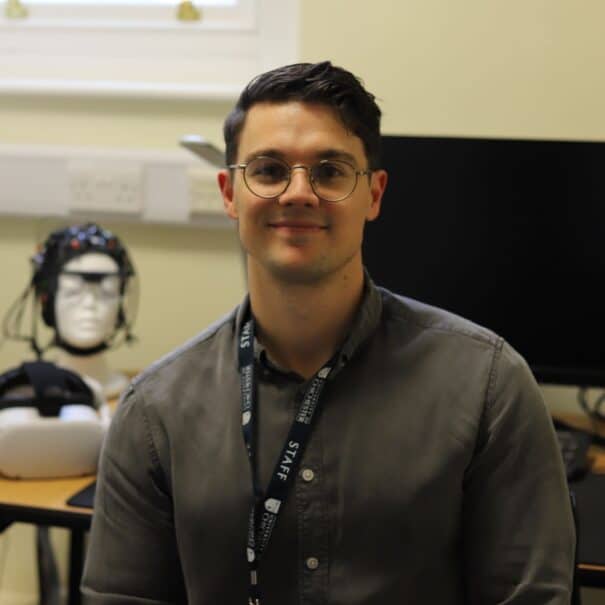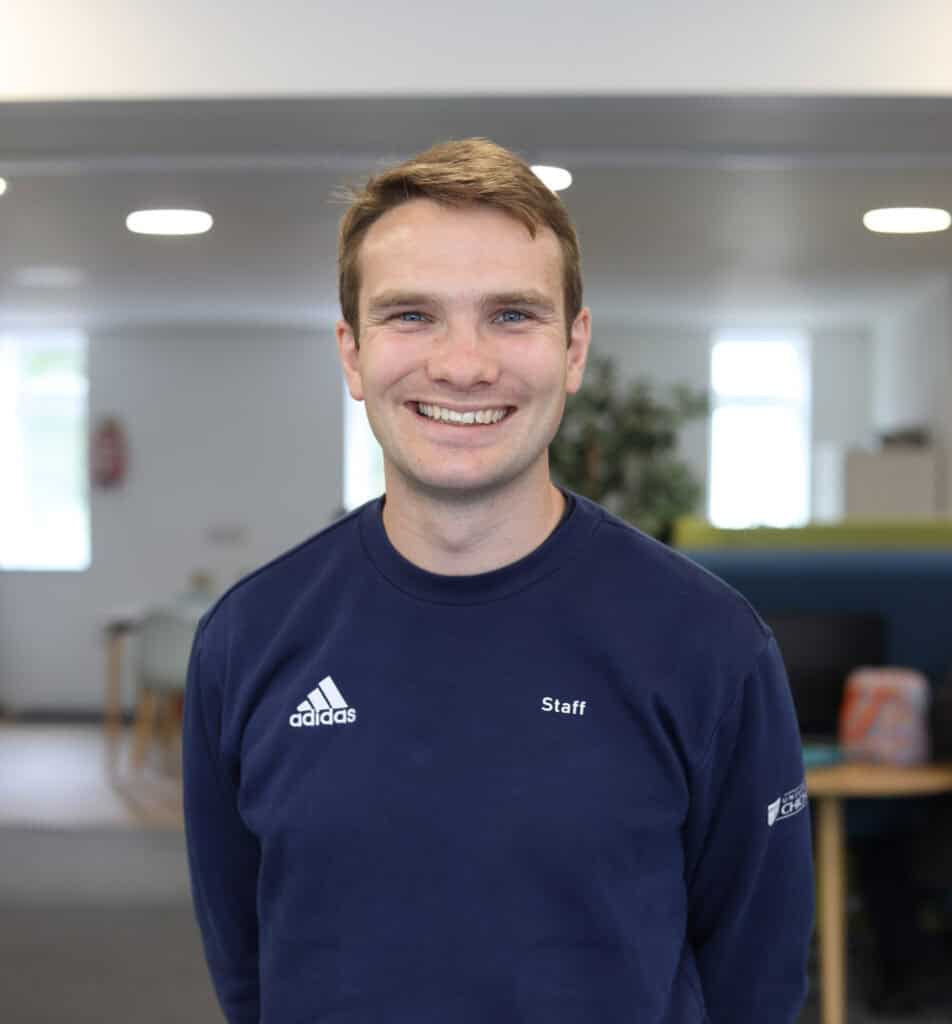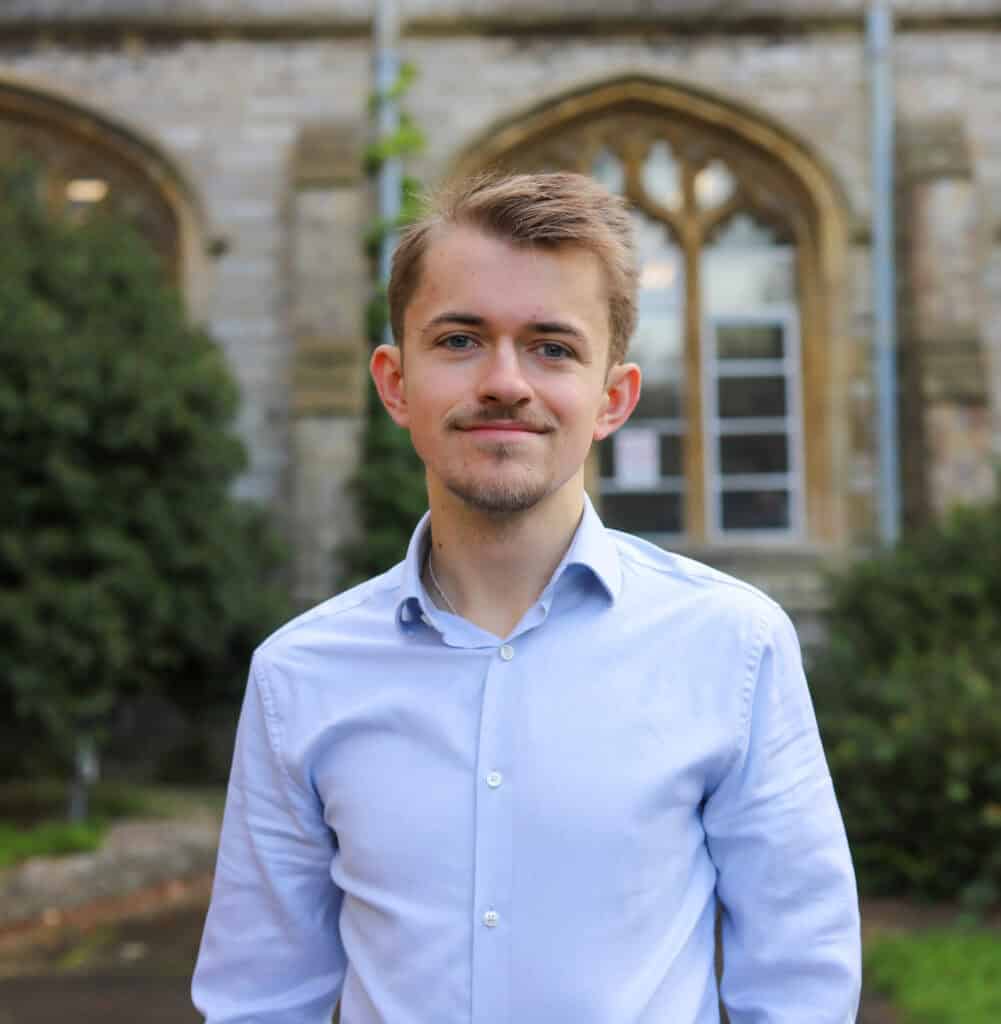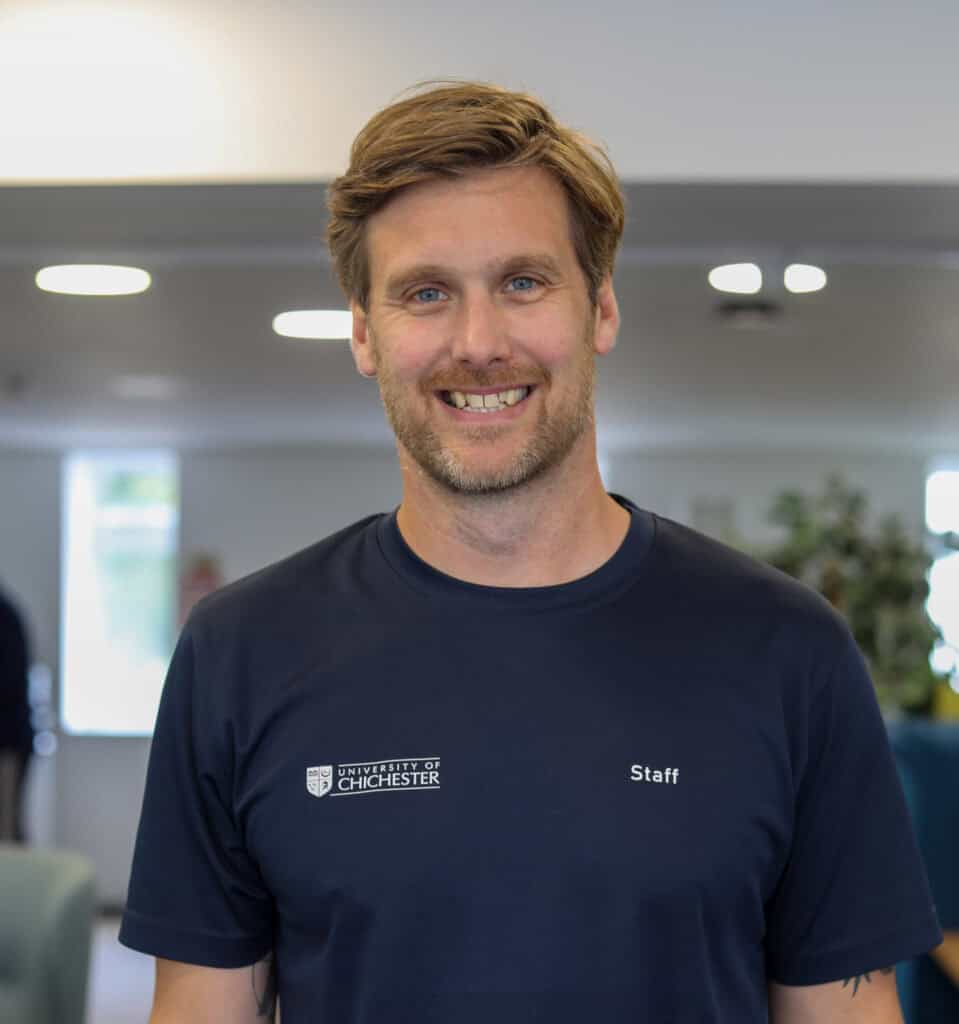Dr Benjamin T. Sharpe
Senior Lecturer in Cognitive Psychology, Director of the Human Attention Laboratory, Coordinator for the BSc Psychology of Esports and BSc Criminology and Forensic Psychology Programmes

About
Leads the Human Attention Laboratory (HAL), Post-Doctoral Researcher in the Cognitive Ageing and Dementia Research Lab, and is a member of the Functional Behavioural Science Lab, Occupational Performance Research Group (OPRG), and the Lab for Self-Efficacy, Performance and Agency (LSPA)
Dr Benjamin Sharpe is a senior lecturer and researcher specializing in cognitive psychology at the University of Chichester’s Institute of Psychology, Business, and Human Sciences. His expertise lies in human cognition, with a particular focus on sustained attention, and his research spans a range of critical areas, including virtual reality, mild cognitive impairment, mental health assessment and validation, neuromodulation, and skill acquisition across diverse populations such as individuals with dementia, esports professionals, lifeguards, and military personnel. Dr Sharpe leads the Human Attention Laboratory at Chichester, where he conducts and collaborates on numerous projects that investigate how sensory and motor signals impact human performance and behaviour. His research employs advanced methodologies, including high-density electrophysiological recording (EEG), optical imaging (fNIRS), and interventional techniques such as tDCS and TMS.
Alongside his research, Dr. Sharpe holds multiple significant roles at the University. He is the founder and Programme Coordinator for the BSc (Hons) Psychology of Esports, Programme Coordinator for the BSc (Hons) in Criminology and Forensic Psychology, the Professional Learning & Quality Assurance Officer for The Human Factor, and serves as the Staff CPD Coordinator and Technology Officer within his institute. He is also a member of the University’s Academic Board and the Research and Innovation Committee. Additionally, Dr. Sharpe is a post-doctoral researcher with the Cognitive Ageing and Dementia Laboratory, where he contributes to cutting-edge studies on cognitive ageing.
Dr Sharpe completed his PhD at the University of Chichester, collaborating with King’s College London, the Royal Life Saving Society, and the Royal National Lifeboat Institute. His doctoral research focused on the psychological and neurocognitive factors essential for detection performance, leading to meaningful updates in lifeguard training manuals and practices. For collaboration opportunities or to discuss his work, Dr. Sharpe can be contacted at b.sharpe@chi.ac.uk.
PhD Supervision
Ben is actively looking for motivated individuals to supervise for PhD programmes on topics related, but not limited to, cognition, sustained attention (vigilance), performance breakdowns under pressure, scene perception, drowning detection, esports. Please review the following link for fees [Link] and then contact Ben if interested [b.sharpe@chi.ac.uk].
Research Output
Articles
Seymour, L., Seymour, S., Sharpe, B. T., Nandy, M., Lodh, S. and Banerjee, M. (2025) The use of mindfulness in the metaverse: a scoping review. Mindfulness. pp. 1-44. ISSN 1868-8527 10.1007/s12671-025-02608-6
Sharpe, B. T., King, R., Banerjee, M., Keates, S., Tyndall, I., Kooner-Evans, P., Sivyer, L., Cotten, E., Obine, E., Tabet, N., Ronen, I., Davies, N., Lewis, I., Tabbner, S., Wilkins, T. and Pereira, A. (2025) Experiences of individuals living with dementia, caregivers, and service providers regarding independence-enhancing technologies: focus group insights. Disability and Rehabilitation: Assistive Technology. pp. 1-20. ISSN 1748-3107 10.1080/17483107.2025.2511996
Cotten, E. L., Sivyer, L. R., Spina, R. and Sharpe, B. T. (2025) The Jury on Trial: Assessing the Impact of Courtroom Design and Juror Ideology on Defendant Guilt Perception. The Howard Journal of Crime and Justice. pp. 1-7. ISSN 2059-1101 10.1111/hojo.12610
Sharpe, B. T., Sharpe, A., Poulus, D., Obine, E., King, R., Birch, P. D. J. and Gladwin, T. E. (2025) Enhancing pressurized esports performance: a pilot study on the combined effects of transcranial direct current stimulation and arousal reappraisal. Anxiety, stress, and coping. pp. 1-17. ISSN 1477-2205 10.1080/10615806.2025.2502792
Sharpe, B. T. and Spooner, R. (2025) Dopamine-scrolling: a modern public health challenge requiring urgent attention. Perspectives in Public Health. p. 1. ISSN 1757-9147 10.1177/17579139251331914
Sharpe, B. T., Blacker, S. D., Myers, S. D., Birch, P. D. J., Poulus, D. and Vine, C. (2025) Commentary of the transferability of esports to military and emergency responder roles. Journal of Electronic Gaming and Esports. pp. 1-20. ISSN 2836-3523 (In Press)
Sharpe, B. T., Smith, M. S., Williams, S. C. R., Hampshire, A., Balaet, M., Trender, W., Hellyer, P., Talbot, J. and Smith, J. (2025) Beyond certification: improving lifeguard drowning detection through validated tools and specialized training. Journal of Industrial Ergonomics, 107. pp. 1-12. ISSN 0169-8141 10.1016/j.ergon.2025.103741
Sharpe, B. T. and Tyndall, I. (2025) The sustained attention paradox: a critical commentary on the theoretical impossibility of perfect vigilance. Cognitive Science, 49 (4). pp. 1-15. ISSN 0364-0213 10.1111/cogs.70061
Leis, O., Sharpe, B. T., Moriconi, M., Ascenso, I. and Barkoukis, V. (2025) Educational needs of the esports industry: a Delphi study. Journal of Electronic Gaming and Esports, 3 (1). pp. 1-17. ISSN 2836-3523 10.1123/jege.2024-0030
Sharpe, B. T. and Birch, P. D. J. (2025) Psychology of Esports Special Issue: A Catalyst for Change. Journal of Electronic Gaming and Esports, 2 (1). pp. 1-8. ISSN 2836-3523 10.1123/jege.2024-0058
Horne, G. and Sharpe, B. T. (2024) Esports are pretty far from Bodhi trees: touch grass for performance and well-being. Journal of Electronic Gaming and Esports, 2 (1). pp. 1-5. ISSN 2836-3523 10.1123/jege.2024-0038
Leis, O., Praisan, G., Pedraza-Ramirez, I., Sharpe, B. T., Laborde, S. and Lautenbach, F. (2024) Exploratory study of psychophysiological Stress in esports: training and competition in professional League of Legends. Journal of Electronic Gaming and Esports, 2 (1). pp. 1-13. ISSN 2836-3523 10.1123/jege.2024-0033
Sharpe, B. T. and Smith, J. (2024) Influence of vigilance performance on lifeguard gaze behaviour. Europe's Journal of Psychology, 20 (3). pp. 220-233. ISSN 1841-0413 10.23668/psycharchives.14188
Poulus, D., Sharpe, B. T., Jackman, P., Swann, C. and Bennett, K. (2024) Defining elite esports athletes: a scoping review. International Review of Sport and Exercise Psychology. pp. 1-36. ISSN 1750-984X 10.1080/1750984X.2024.2386531
Leis, O., Sharpe, B. T., Pelikan, V., Nicholls, A., Fritsch, J. and Poulus, D. (2024) Stressors and coping strategies in esports: a systematic review. International Review of Sport and Exercise Psychology. pp. 1-31. ISSN 1750-984X 10.1080/1750984X.2024.2386528
Walker, F. S., Needham-Beck, S., Vine, C., Blacker, S. D., Greenlees, I. A., Sharpe, B. T., Siddall, A. G., Maroni, T. D., Ashdown, K., Hinde, K., Elliott, E., Rayson, M. P., Knight, E. and Myers, S. D. (2024) External workload and cognitive performance of a tactical military scenario-based field exercise. BMJ Military Health. pp. 1-23. ISSN 2633-3767 10.1136/military-2024-002672
Bonilla, I., Chamarro, A., Birch, P. D. J., Sharpe, B. T., Martín-Castellanos, A., Muriarte, D. and Ventura, C. (2024) Conceptualization and validation of the TILT questionnaire: Relationship with IGD and Life Satisfaction. Frontiers in Psychology, 15. pp. 1-30. ISSN 1664-1078 10.3389/fpsyg.2024.1409368
Birch, P. D. J., Smith, M. J., Arumuham, A., Ortiz de Gortari, A. and Sharpe, B. T. (2024) The prevalence of mental ill health in elite Counter-Strike athletes. Journal of Electronic Gaming and Esports, 2 (1). pp. 1-23. ISSN 2836-3523 10.1123/jege.2024-0006
Sharpe, B. T., Leis, O., Moore, L., Sharpe, A., Seymour, S., Obine, E. and Poulus, D. (2024) Reappraisal and mindset interventions on pressurised esport performance. Applied Psychology: An International Review, 73 (4). pp. 2178-2199. ISSN 1464-0597 10.1111/apps.12544
Griffith, O. and Sharpe, B. T. (2024) Investigating psychological disparities across gamers: a genre-based study. Journal of Electronic Gaming and Esports, 2 (1). pp. 1-9. ISSN 2836-3523 jege.2023-0040
Figgins, S. G., Slater, M. J., Smith, M. J., Miller, A. J., Sharpe, B. T., Pocock, C. and Maiden, J. (2024) Promote “we” to inspire me: examining the roles of group identification and trust in the association between identity leadership and follower inspiration. International Journal of Sport and Exercise Psychology, 23 (2). pp. 261-280. ISSN 1557-251X 10.1080/1612197X.2023.2300001
King, R., Surrell, I., Sharpe, B. T. and Pereira, A. (2023) An integrated approach to dementia support: Sage House. Alzheimer's & Dementia: The Journal of the Alzheimer's Association, 19 (S20). p. 1. ISSN 1552-5260 10.1002/alz.075707
Sharpe, B. T., Obine, E., Birch, P. D. J., Pocock, C. and Moore, L. (2023) Performance breakdown under pressure among esports competitors. Sport, Exercise, and Performance Psychology. pp. 1-22. ISSN 2157-3905 10.1037/spy0000337
Runswick, O. R., Rawlinson, A., Allen, P. M., Sharpe, B. T., Pocock, C., Datson, N., Birch, P. D. J., Bruce, R. and Mann, D. L. (2023) The effects of simulated vision impairment on performance in football. Journal of Sports Sciences, 41 (14). pp. 1410-1422. ISSN 0264-0414 10.1080/02640414.2023.2273093
Sharpe, B. T., Smith, M. S., Williams, S. C. R., Hampshire, A., Balaet, M., Trender, W., Hellyer, P., Talbot, J. and Smith, J. (2023) Cognition and lifeguard detection performance. Applied Cognitive Psychology, 38 (1). pp. 1-15. ISSN 1099-0720 10.1002/acp.4139
Trotter, M. G., Obine, E. and Sharpe, B. T. (2023) Self-regulation, stress appraisal, and esport action performance. Frontiers in Psychology, 14. pp. 1-12. ISSN 1664-1078 10.3389/fpsyg.2023.1265778
Sharpe, B. T., Smit, M. S., Williams, S. C. R., Talbot, J., Runswick, O. R. and Smith, J. (2023) An expert-novice comparison of lifeguard specific vigilance performance. Journal of Safety Research, 87. pp. 416-430. ISSN 0022-4375 10.1016/j.jsr.2023.08.014
Welsh, M. R., Mosley, E., Laborde, S., Day, M. C., Sharpe, B. T., Burkill, R. A. and Birch, P. D. J. (2023) The use of heart rate variability in esports: a systematic review. Psychology of Sport and Exercise, 69. pp. 1-38. ISSN 1469-0292 10.1016/j.psychsport.2023.102495
Birch, P. D. J., Greenlees, L. and Sharpe, B. T. (2023) An Exploratory Investigation of Personality in Counter-Strike:Global Offensive. Journal of Electronic Gaming and Esports, 1 (1). pp. 1-9. ISSN 2836-3523 10.1123/jege.2022-0027
Sharpe, B. T., Besombes, N., Welsh, M. R. and Birch, P. D. J. (2023) Indexing Esport Performance. Journal of Electronic Gaming and Esports. pp. 1-13. ISSN 2836-3523 10.1123/jege.2022-0017
Smith, M. J., Sharpe, B. T., Arumuham, A. and Birch, P. D. J. (2022) Examining the Predictors of Mental Ill Health in Esport Competitors. Healthcare, 10 (4). ISSN 2227-9032 10.3390/healthcare10040626
Ritchie, L. and Sharpe, B. T. (2021) Music Student’s Approach to the Forced Use of Remote Performance Assessments. Frontiers in Psychology, 12. ISSN 1664-1078 10.3389/fpsyg.2021.641667
Runswick, O. R., Jewiss, M., Sharpe, B. T. and North, J. S. (2021) Context Affects Quiet Eye Duration and Motor Performance Independent of Cognitive Effort. Journal of Sport and Exercise Psychology, 43 (2). pp. 191-197. ISSN 0895-2779 10.1123/jsep.2020-0026
Ritchie, L., Cervone, D. and Sharpe, B. T. (2021) Goals and Self-Efficacy Beliefs During the Initial COVID-19 Lockdown: A Mixed Methods Analysis. Frontiers in Psychology, 11. ISSN 1664-1078 10.3389/fpsyg.2020.559114
Moore, L. J., Harris, D. J., Sharpe, B. T., Vine, S. J. and Wilson, M. R. (2019) Perceptual-cognitive expertise when refereeing the scrum in rugby union. Journal of Sports Sciences, 37 (15). pp. 1778-1786. ISSN 0264-0414 10.1080/02640414.2019.1594568
Conference or Workshop Items
Welsh, M. R., Mosley, E., Laborde, S., Day, M. C., Sharpe, B. T. and Birch, P. D. J. (2024) Investigating the effect of pressure on heart rate variability in (HRV) esports. In: 17th European Congress of Sport Psychology, 15 - 19 July 2024, Innsbruck, Austria.
Birch, P. D. J., Sharpe, B. T., Obine, E., Pocock, C. and Moore, L. (2024) Pressure impacts esports performance. In: 17th European Congress of Sport Psychology, 15 - 19 July 2024, Innsbruck, Austria. (Unpublished)
Bonilla, I., Birch, P. D. J., Sharpe, B. T., Martín-Castellanos, A., Muriarte, D. and Ventura, C. (2024) Tilt on esports: conceptualization and measurement. In: 17th European Congress of Sport Psychology, 15 - 19 July 2024, Innsbruck, Austria.
Welsh, M. R., Mosley, E., Laborde, S., Day, M. C., Sharpe, B. T., Burkill, R. A. and Birch, P. D. J. (2024) The use of heart rate variability in esports: a systematic review. In: 17th European Congress of Sport Psychology, 15 - 19 July 2024, Innsbruck, Austria. (Unpublished)
Birch, P. D. J. and Sharpe, B. T. (2023) Mental (ill) health and performance. In: International Federation of Esports Coaches Summit, 6 - 7 September 2023, University of Northampton (online).
Birch, P. D. J., Sharpe, B. T., Ortiz de Gortari, A., Arumuham, A. and Smith, M. J. (2023) Mental ill health in professional esports athletes: prevalence and relationships. In: Annual Research Conference 2023, University of Chichester, 5 - 6 July 2023, Bognor Regis, England.
Welsh, M. R., Mosley, E., Laborde, S., Day, M. C., Sharpe, B. T., Burkill, R. A. and Birch, P. D. J. (2023) The use of heart rate variability in esports: a systematic review. In: Annual Research Conference 2023, University of Chichester, 5 - 6 July 2023, Bognor Regis, England.
Sharpe, B. T., Obine, E., Birch, P. D. J., Pocock, C. and Moore, L. (2023) Stress influences gaze behaviour, quiet eye durations, and esport action performance. In: Annual Research Conference 2023, University of Chichester, 5 - 6 July 2023, Bognor Regis, England.
Birch, P. D. J., Sharpe, B. T., Ortiz de Gortari, A., Arumuham, A. and Smith, M. J. (2022) Mental ill health in professional esports athletes: Prevalence and relationships. In: ERNC 22: Esports Research Network Conference, 21 - 23 November 2022, Jönköping,Sweden.
Birch, P. D. J., Sharpe, B. T., Ortiz de Gortari, A., Arumuham, A. and Smith, M. J. (2022) Mental ill health in professional esports athletes: Prevalence and relationships. In: FEPSAC 2022, Padova: 16th European Congress of Sport & Exercise Psychology, 11 - 16 July 2022, Padova, Italy.
Sharpe, B. T., Besombes, N., Welsh, M. R. and Birch, P. D. J. (2022) Psychological index of individualised esports performance. In: FEPSAC 2022, Padova: 16th European Congress of Sport & Exercise Psychology, 11 - 16 July 2022, Padova, Italy.





